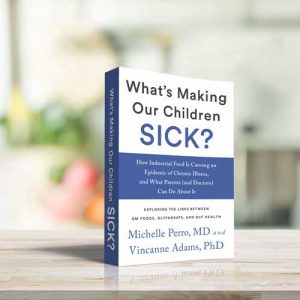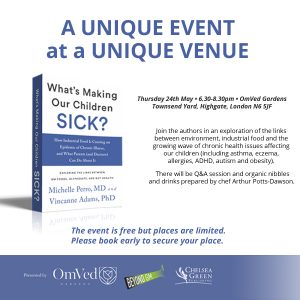
More evidence that low-calorie sweeteners are bad for your health
Studies show that artificial sweeteners can raise the risk of hypertension, metabolic syndrome, type 2 diabetes and heart disease, including stroke.

This month sees the UK release of an important book, What’s Making Our Children Sick? How Industrial Food Is Causing an Epidemic of Chronic Illness, and What Parents (and Doctors) Can Do About It.
With chronic disorders among children in the developed world reaching epidemic levels, parents are desperately seeking solutions to their children’s declining health, often with little medical guidance from the experts.
In their book, Drs Michelle Perro and Vincanne Adams provide both insight and guidance, showing that, in their combined experience, hard-to-diagnose and hard-to-treat chronic health problems in children are rooted in diet and environment.
The book provides clinical case studies illustrating how the health problems of many children – allergies, asthma, rashes, gastrointestinal issues, autoimmune disorders, and cognitive malfunction – can be successfully treated through the gut with a fresh, organic (and therefore non-GMO and pesticide-free) wholefood diet.
These treatment successes are related, in part, to the impact that diet has on the community of bacteria and other microorganisms in the body, collectively known as the microbiome. In this Q&A they talk about the book and some of their findings.
Question: Why did you write this book?
Michelle: I’ve always considered myself a ‘front-line’ doctor, whether attending in the Emergency Department or working in the clinic, with my focus on taking care of patients. I began working in an integrative clinic five years ago, caring for some of the most chronic, complex health challenges in children that I could ever imagine.

On May 24, in London, the authors will be giving a talk about the book and their journey of writing it. The event at OmVed Gardens is free – and will include organic refreshments and lots of resources to take away – but booking is essential. Click to reserve your place now.
The crux of the practice of holistic care is that it is individualized, and that requires taking a significant amount of time sorting out each patient’s history and working out a unique treatment plan. One day at the end of a busy clinic session, I became concerned regarding the multitude of children that I could not see, that didn’t have access to the type of practitioner that looked at toxic food and environmental poisons as being potential culprits in the decline of kids’ health.
So I decided to write a book. I had a serendipitous encounter with Dr. Vincanne Adams, an extraordinary, brilliant medical anthropologist and author and together, we married the fields of clinical medicine and anthropology to create our book, What’s Making our Children Sick?
Vincanne: When I first met Michelle and began to hear about her medical practices I was fascinated. Her work touched on many aspects of the work I had done as a medical anthropologist. This included exploring how non-Western medical systems paid more attention to food and ecosystem-wide, holistic approaches to health.
Initially I thought it would be amazing to write a book about Michelle and her integrative practice. Her stories were fascinating and compelling. . I interviewed physicians and scientists about the phenomena that Michelle had identified. I shadowed Michelle in her clinical practice and together we interviewed her patients so that I could better understand the human and clinical story behind her ideas about these food-health connections. All this information has been collected in the book.
Question: Can you tell us something about how the book?
Vincanne: The book covers how and why medicine tends to seek pharmaceutical over food-based health solutions; how new biomedical research on things like the microbiome, leaky gut or dysbiosis are still a long way from being incorporated into standard practice guidelines and how integrative doctors are breaking the mold; how agrocorporate investments in scientific research have made it hard for insights about the potential harms of GM foods and their associated pesticides to reach the light of day; and how we might think of a future medicine in relation to our ecosystem health – what we call ‘ecomedicine’.
Michelle: The key take-home point is that when patients change their diets to organic food, they get better. My patients are also receiving herbs, supplements, and homeopathic remedies that I recommend, but what is remarkable is that family members who are not my patients also get significantly better.
Question: Is there any research to show that GM foods and their associated pesticides are harmful to consume?
Michelle: I’ve felt frustration over the past two decades over the lack of research on the effects of GM foods and their associated pesticides on human health.
But several animal studies caused light bulbs to switch on in my head. The first was the work of Dr. Arpad Pusztai, a European scientist. His research examined rats fed GM potatoes compared to those fed non-GM potatoes. (When I saw the intestinal disruption of the villi in the rats (fingerlike projections in the gut lining responsible for nutrient absorption), it brought to mind the explosion of intestinal permeability that I was seeing in my child patients.
The second ‘aha’ moment was viewing the gross pathology found in the study on pigs carried out by Dr. Judy Carman and Howard Vlieger. The stomachs of pigs fed GM soy and corn, their typical diet, were compared to those fed non-GM soy and corn. The visual difference of the extensive inflammation in the GM-fed pigs compared to the normal stomachs of the non-GM fed pigs was shocking.
Two further independent studies that helped improve and alter my practice were based on work led by Prof Gilles-Eric Séralini and some follow-up research led by Dr. Michael Antoniou.
Prof Séralini’s team concluded that there were toxic effects to the liver and kidney of rats fed GM corn and an ultra-low dose of the glyphosate-based herbicide (Roundup) that it was engineered to be grown with, when tested separately and together.
Recent follow-up studies led by Dr. Antoniou used cutting-edge “molecular profiling” (transcriptomics, proteomics, and metabolomics) analytical techniques to examine tissues taken from the rats in the Séralini experiment.
These studies showed that an ultra-low dose of Roundup fed over a long-term two-year period caused kidney and especially liver damage, resulting in Non-Alcoholic Fatty Liver Disease (NAFLD). NAFLD now affects 1 in 4 American adults, and is also becoming a problem for children.
Question: Was there anything that stood out or surprised you when you were writing the book?
Michelle: I was shocked first by the fact that these findings were unreported and unknown among health practitioners. Second, I was shocked by the vehemence of the attacks on scientists whose work questions the safety or efficacy of GM foods and their associated pesticides (some of the scientists who led the studies I mention above are cases in point). Such attacks are not only ethically wrong, but discourage others from questioning the effects of industrial food on health. Third, I was shocked that many of these findings were known to the regulatory agencies that were designed to protect the public from the untoward effects of new products on health. But these agencies succumbed to the pressure by big agribusiness and failed to do their job. And last but not least, I was shocked to find that there are no human studies on the effects of GM food on health. Additionally, there are no human studies on the health effects of combinations of toxins.
Vincanne: One of the things that surprised me about this project was how convinced I became that GM foods and their associated pesticides were a problem. When I began, I honestly didn’t initially think GM foods were as big a problem as Michelle and others made them out to be. However, the more I learned about the theories of chronic illness that were being talked about in the integrative medical world and the amazing assault-like campaigns to dismiss concern over these food technologies, the more I was convinced.
Question: Have you made any changes in your own life as a result of what you learned when writing this book?
Vincanne: Well, although I always felt that organic foods were probably better for me, I never really thought that eating non-organic was potentially dangerous. But now I certainly try to eat only organic. It is clear that harm from foods functions as more of a ‘carrying capacity’ or ‘toxic load’ issue than a straight ‘eat-this-and-you die’ set of measures. Even so, I pay more attention to gut health in general now.
Working on this book has also shifted my perspective on population health and my vision of a society whose health is impaired, or at least less than robust, for the simple reason that our nutrition is compromised. It starts with a variety of things that compromise gut health, from antibiotics to toxicants in the built environment (such as chemicals used in building materials and soft furnishings) and in body and hygiene products, and extends also to the health of the foods we eat. Going beyond the normal culprits like packaged and processed foods, how healthy are our real foods? Then, we need to talk about toxicants like pesticides in our foods, and foods that have been turned into pesticides via genetic modification. We really don’t know much about these in terms of their safety for humans but we have a considerable body of research based on animal studies that is pointing to risks.
Q: Is there anything else you wish to say?
Michelle: My hope for this book is to reach those individuals who are concerned about the current epidemic of illness and want to help change this ominous course. I support readers to question our book and do their own investigations. I’m hopeful that parents will engage in meaningful dialogues with their own paediatricians and that together we can create positive change. I’m fully confident that we can restore our children and ourselves to our natural state of good health.
Vincanne: We need to change both our concept of public health and the kind of medicine we practice. On top of this, we need to think about how planetary survival really may depend on organic solutions – the opposite of what GM food scientists and agrochemical companies have been saying for several decades. My hope is that this book will help people think about how a healthy body is really only possible in a healthy food environment. In order to bring that about, we need to rethink our paradigms about the relationships between health and food, food and soil, and our bodies and society, or what we call ecomedicine.

Please subscribe me to your newsletter mailing list. I have read the
privacy statement